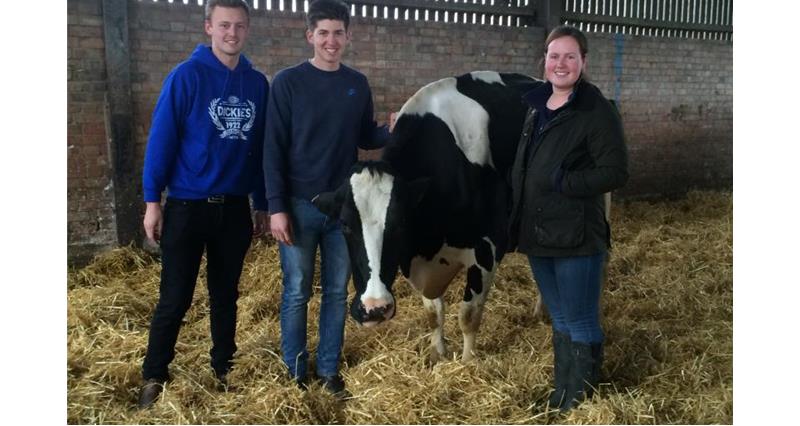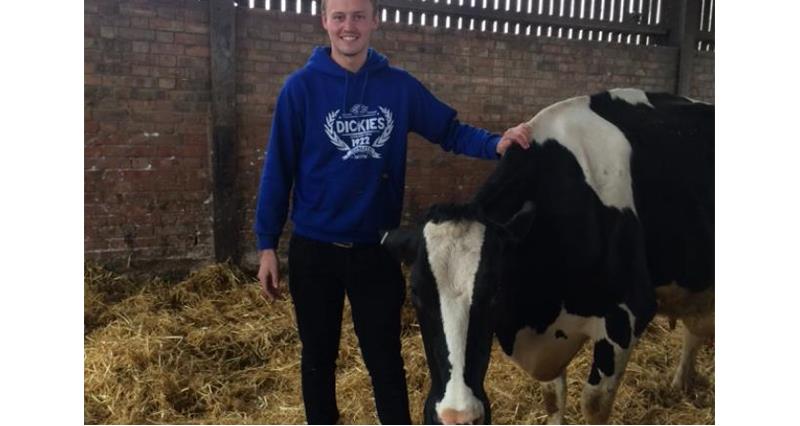Meet some of the young farmers and growers who are studying apprenticeships as an option to further their career in the sector, proving that there is an alternative to burying your head in a textbook. You never know, it could just be for you.
Charlie Phipps
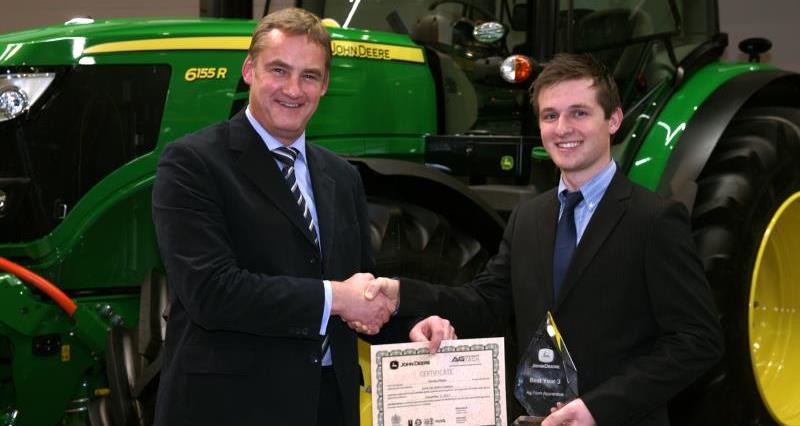
Practice makes perfect. That’s Charlie Phipps’ motto, and after winning John Deere’s apprentice of the year award last year he’s convinced the sky’s the limit. Let’s be honest, he works with brand-spanking-new farm machinery every day – what’s not to love?
The apprenticeship is hands down the best decision I ever made. Fact.
I come from a mixed family farm, and for my apprenticeship I studied in partnership with a company called Farol, as well as John Deere, and the application process was easy. My brother had already done an apprenticeship with Farol and John Deere three years prior, and he really recommended it. I’d been to college prior to it and it was really practical, so the apprenticeship allowed me to keep learning in the workplace.
It’s a mix of both working and learning.
The first think I did was contact my local John Deere dealer, and following a two-week trial they offered me an apprenticeship. During the three-year course you spend eight weeks at college, then the rest of the time in the workplace.
The best thing about it? I got a job at the end.
During my apprenticeship I spent all of my time maintaining and repairing machines both in the workshop and on customer’s farms. I worked alongside fully trained technicians to help build up my skills, and once I finished my apprenticeship I got offered the position of service adviser, so I now organise the technicians day-to-day schedule, and plan work to ensure that all the work is completed to a high standard. Plus, it’s really important to reduce customer downtime and increase efficiencies.
It’s given me a building block.
As my family are all involved in farming both arable and livestock, it’s played a huge part in my career choices, and the apprenticeship has given me a good building block in working within the agricultural business. It gives you the tools to start a career in anything, and sets you up with the knowledge and attributes required to be successful in the workplace.
Work ready? No problem.
University gives you the knowledge, but an apprenticeship gives you the knowledge and the chance to put it into practice to ensure it stays with you for life. In any business some of the highest people normally started from the bottom and have worked their way up. Apprenticeships give you the chance to do that.
Rosie Wade
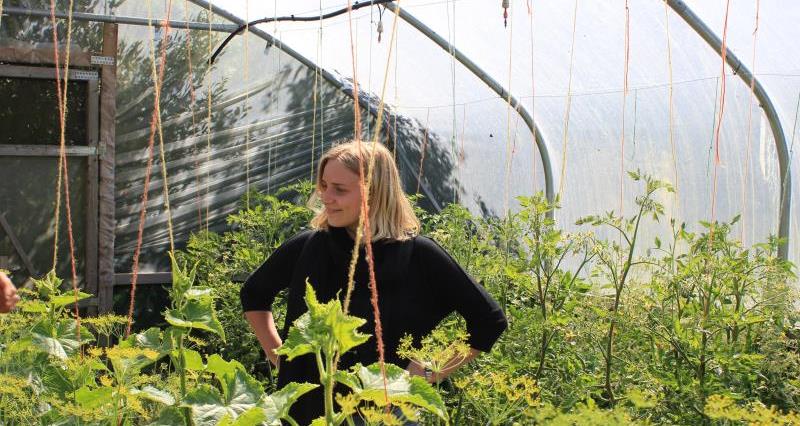
Most people think the Eden Project is just a fancy structure that people go to point and stare at. Wrong. City girl Rosie has learnt everything she knows about horticulture thanks to the project, and is determined to show that just about anyone can study an apprenticeship, no matter what their background is.
I’ve got no farming background as I grew up in London.
Funnily enough, there isn’t much agricultural work in the city, but my mum got an allotment so I started to help her, then after that I was there more than her. Being outdoors and engulfed in nature was a good start to being hooked to horticulture, and travelling and seeing different plants in different climates was pretty awesome
I didn’t want to go to university thanks to the idea of debt.
But I didn’t want that to stop me from learning. I’d visited Eden before and I knew I loved it. I always knew that having experience in your chosen field - especially 2 years' experience - was going to be better than just studying it. I wanted that hands on job and that's exactly what I got. As I am an older apprentice of 24 years old, I kind of took this apprenticeship thinking that it was my university.
Apprenticeships = independence.
You don't need experience in whatever field you choose to do one in. Everybody is willing to help you get the best out of your time. You will be working with people who are so skilled in what they do. You are a full time member of staff and get treated the exact same as a full timer. Then – as a complete bonus - you're getting paid a wage! It also helps out the full time members of staff because you will be asking questions that they might not have been asked before.
The learning process changes throughout.
For the first year we change teams every three weeks, this is so we can understand what each team really does. Then for the second we focus on our chosen placements, this will be for about seven weeks. I’m learning everything from rainforest conservation to environmental issues to floristry to even Eden weddings.
I’ve never looked back.
It’s given me more money and a working environment. Some people could come out of university with no knowledge of what working life is like, only education. Its hands-on experience, you're working with people that have the knowledge that you are aiming for. So to be around those people and see them doing their job, that's a pretty good way to learn. For me, two years of experience in horticulture is so much more than a three year degree.
Louise Youles
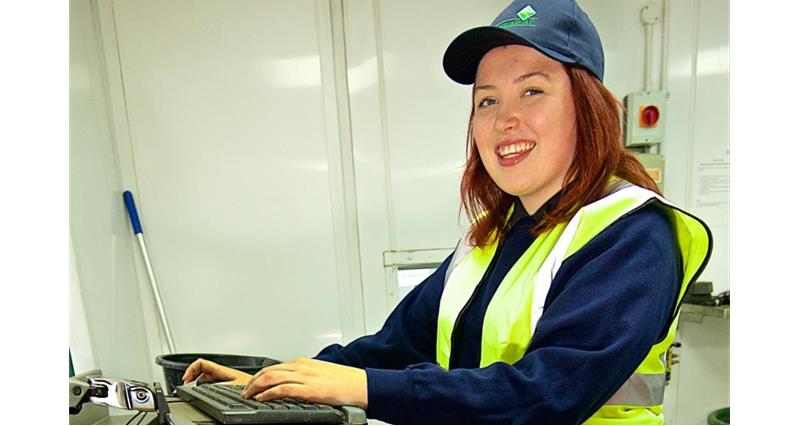
After hearing stories about how her grandfather used to own a local farm, Louise Youles knew that she wanted to give it a go, but didn’t know where to start. A-levels didn’t quite suit her, so when she saw an apprenticeship advert in the paper, she bit Greenvale’s hand off.
Farming got under my skin.
My grandad used to be a farmer – he owned the farm just along the road from Greenvale. He was farming a bit of everything including potatoes. I’ve heard all the stories about farming and producing, and I just wanted to get involved.
The A-level route wasn’t for me.
I didn’t do as well in my first year as I would’ve hoped, which meant I had to look at other routes and opportunities. I saw the position at Greenvale in the local paper. It’s a local company for me, and as I knew a bit about farming and the job role I thought ‘Why not?’ - It offered me the chance to experience different areas of the factory and the potatoes sector.
It’s the best decision I ever made.
Studying wasn’t a good plan as it just wasn’t working for me. The apprenticeship offers me the opportunity to try different things while learning on the job. At the moment I’m in a fixed job role along with my level two apprenticeship as a production administrator, but for my first year I moved around the factory and learnt about all the different areas from intake, the weighbridge in the factory itself, dispatch, and even learning a little bit about HR. There was never a dull moment.
Haven’t got a clue what you’re good at? Don’t worry.
You can see what sort of area suits you and, I really enjoyed working at the weighbridge, which I would never have guessed if I hadn’t been given the opportunity to experience it. For the first year I had to learn about all the different jobs.
If I was reading out of the textbook, I’d go blank.
Apprenticeships give you the chance to learn and gain that experience that two or three years in academic study can’t give you. You can’t grasp the complexity of things sometimes. You get to see things for yourself and visualise it. It’s opened so many doors, though. If I get offered a job at Greenvale once I’ve finished that will be amazing, but I’m also looking at completing a level four apprenticeship which is equivalent to a degree, hopefully doing it within my company if I can.
Danny Gapp
Danny Gapp was born into a family of dairy farmers, and always knew he wanted to be part of the business one day. But he’s determined to learn more to make sure the family business is the best it can be.
I love dairy, but I wanted to expand my knowledge.
The apprenticeship gives you the opportunity to work with different breeds have been really interesting. I’m really keen to work with different animals and learn more skills. It’s furthered my knowledge with the animals I hope to work with, and the place where I’m learning my apprenticeship has a wide-range of animals including beef cattle, sheep and pigs. As I was working full time on the farm already I wanted to be able to gain more knowledge from college to support the practical elements.
I want to enhance our family business.
There’s always new ways to do things, and I want to try and apply the knowledge I’ve learnt during my apprenticeship to improve the farm back at home. That’s really the end goal. Working with other likeminded people really opens your eyes to doing things differently. I love it.
You learn vital life skills.
I’d recommend apprenticeships if you’re a physical, hands-on learner, rather than sitting behind a desk. You get paid on the job as well, so there’s an aspect of earning your own money and budgeting, which all prepares you for future jobs. I can practice as much as I want on the herd too, which I probably wouldn’t be able to if I came straight out of university, and you get work packs on every aspect of livestock management.
Ashley Maskell
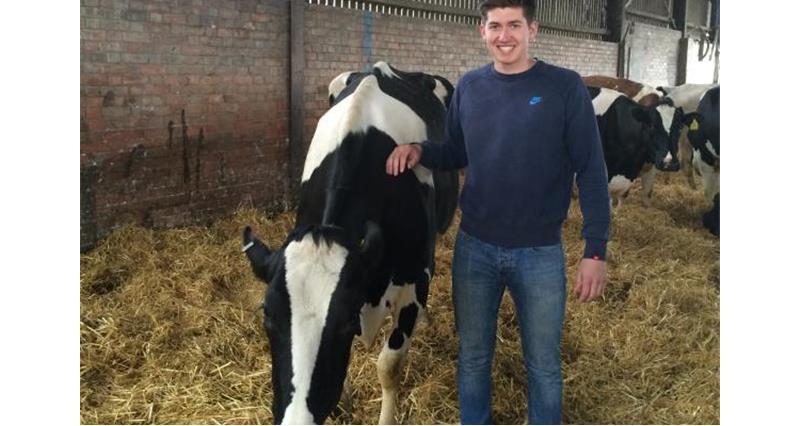
Some might say Ashley is mad about pigs – he works on a farm with 1,100 of them. And even though it’s his grandad’s farm, he thinks that apprenticeships can offer those without a farming background a route in.
I’m lucky – I have my grandad.
He’s a pig farmer, and I used to go around after school to help out as much as I could, and now I’m employed by his business for my apprenticeship. I love the reward of getting the animal to its end goal weight – sounds weird but it’s a great feeling.
Knowledge building – that’s why it’s for me.
I was working on the farm and I wanted to enhance my knowledge and learn different practical skills that I could apply in my work life. The learning is split into different weeks, which cover different topics relating to the area you want to focus on. Then you can apply your learning on the job.
People think that farming isn’t the easiest thing to get into.
Especially if you’re not from a farming family. But it doesn’t need to be that way – apprenticeships offer those with no background in farming the chance to experience it - we’re not all lucky enough to be given a farm from day one. Working at the same time as learning is really beneficial, because you can always improve on what you’re learning.
Molly Sellar
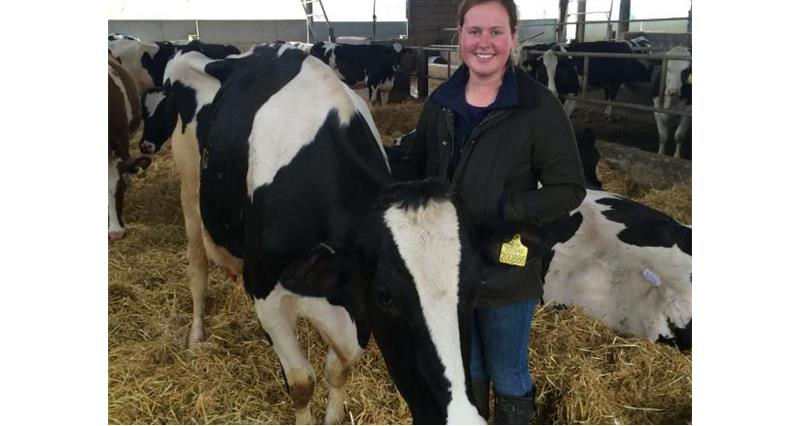
Molly Sellar has big hopes for the future, and wants to own her own dairy farm. She’s determined to prove that there is a future in dairy, and she’s going to make it.
Sheep? No way.
My dad is a farm manager of a sheep enterprise, but I ‘ve always been interested in cows, so I decided that’s what I was going to do, and I did it. I love learning about the cows, the milking process and the management of the animals. Maybe one day I could have my own dairy? Definitely.
Four walls is a massive turn off.
Being stuck in college all week is a massive turn off – how are you going to learn to deal with a cow unless you’re well, dealing with a cow? You learn the theory, then get out in the field and put it into practice. I find it really easy to apply my knowledge, and if you don’t understand it there are tutors on hand to guide you. It’s constant development.
There are lots of myths about dairy farming.
You sometimes have to take the risk, and then you’ll get the reward. There are lots of stories in the news about volatility in dairy. Lots of people think dairy farming is harsh, especially where calves are involved. But you’re actually really involved with the calves’ upbringing and you’re there hands on and really invested in their health and welfare.
